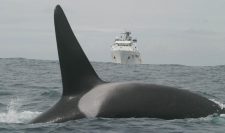Court Decision to Consider Orcas
Posted October 17, 2019 at 6:15 am by Tim Dustrude
WA Superior Court requires state to reconsider impacts to orcas in Skagit County refinery expansion project
Thurston County Superior Court rules on decision from Shoreline Hearings Board related to Marathon Oil’s Anacortes Refinery; environmental groups appealed for failing to consider vessel traffic impacts
THURSTON COUNTY, WA — On Friday, October 11, the Thurston County Superior Court agreed with arguments made by a coalition of environmental organizations and more than 7,500 residents that the Shorelines Hearings Board must consider whether Environmental Impact Statement (EIS) for a refinery expansion project in Skagit County adequately considers vessel traffic impacts to the Salish Sea and the critically endangered Southern Resident orcas, as well as the significant increases in pollution that cause climate change.
The Superior Court ruling is related to a decision from the Shorelines Hearings Board granting permits for an expansion project at Marathon Oil’s (formerly Andeavor and previously known as Tesoro) Anacortes Refinery to begin manufacturing and exporting xylenes — petrochemicals used in plastics production — which would increase vessel traffic in the Salish Sea.
“This ruling means that environmental groups can now argue their case in front of the Shoreline Hearings Board that Skagit County failed to adequately address impacts to orcas and climate in the Environmental Impact Statement for the Anacortes Refinery expansion project. We look forward to having our day in court to get these issues resolved,” said Oliver Stiefel of Crag Law Center, the lawyer representing the case.
“This is a fantastic victory for all of us who live and recreate in the Salish Sea!” said Stephanie Buffum, Executive Director of Friends of the San Juans.
The environmental organizations involved in the appeal in addition to Friends of the San Juans include Evergreen Islands, Stand.earth, RE Sources for Sustainable Communities, Friends of the Earth, and Puget Soundkeeper Alliance.
The groups argued that their appeal of an EIS should be allowed because they chose to appeal the most relevant permit granted under the EIS, rather than the first. An earlier decision by the Shorelines Hearings Board had determined that only an appeal of the first permit issued was allowed and that therefore their appeal was out of order. As a consequence, the Shorelines Hearings Board has never considered the merits of the case — including concerns about Skagit County’s failure to address vessel traffic impacts to the Salish Sea and the critically endangered Southern Resident orcas.
The expansion project would allow the Anacortes Refinery to produce and ship up to 15,000 barrels per day of mixed xylenes for export to predominantly Asian markets. The project would result in the addition of approximately 120 vessel transits per year through the Salish Sea.
Despite significant concerns raised during the public comment period about the project’s vessel traffic impacts on the endangered Southern Resident orcas, the increased risk of a toxic spill, and significant increases in pollution that causes climate change, the Shorelines Hearings Board had not evaluated whether the EIS adequately considered all of the project’s impacts. The decision today reverses that, and will require the Shorelines Hearings Board to reconsider the case and properly evaluate the impacts.
Read more in a Crosscut op-ed: Canada is protecting orcas from oil spills. Why aren’t we? (October 2018)
Background and Timeline:
- Summer 2015: Tesoro proposed the project and began filing permit applications.
- March 2016: Skagit County required a full EIS (environmental impact statement).
- March- April 2017: Skagit County released a Draft Environmental Impact Statement, more than 7,500 comments were submitted. The overwhelming majority of them urged the County to address concerns over worker safety standards, petrochemical spills in the Salish Sea, risks to endangered orcas, increasing crude oil train traffic, and use of the new facility for crude oil export. Commenters also asked the county to separately review the xylene export and clean products upgrade components of the project, while properly accounting for greenhouse gas pollution.
- July 2017: Just two months after the end of the comment period, the County released a Final Environmental Impact Statement which was substantially unchanged from the draft EIS.
- November 2017: Skagit County Hearing Examiner held a public comment period and public hearing on the Shoreline Substantial Development Permit. More than 100 people attend, with 60 of the 65 presenters speaking against the permit.
- December 2017: The Skagit County Hearing Examiner issued the permit. Six organizations, with representation by Crag Law Center, appealed the decision to the Skagit County Board of Commissioners. Concerns raised by the appellant group focus on the need for a Conditional Use Permit and the inadequacy of the EIS’s analysis of spill risk, marine impacts, including the endangered Southern Resident orcas and greenhouse gas analysis.
- February 27, 2018: A hearing was held in front of the Board of Commissioners with arguments made by both sides. More than 100 members of the public attended the hearing most wearing red to signify opposition to the project.
- March 2018: Skagit Board of Commissioners erroneously determined that examination of project impacts beyond the footprint of the Marine Vapor Control System were outside their purview, effectively affirming the Hearing Examiner’s decision.
- April 2018: Appellants requested a review of the decision by the Skagit Board of Commissioners by the Washington State Shorelines Hearings Board. Appellants requested that the SHB vacate the permit and require additional environmental review. The appellants allege that the review, performed by Skagit County staff, failed to adequately consider the impacts from increased vessel traffic in the Salish Sea, increased risk of petrochemical and oil spills, increased emissions of greenhouse gases, increased impacts to air and water quality and increased threats to public health and safety. It also overlooked increased impacts to fish and wildlife resources — including the endangered Southern Resident orcas.
- September 2018: Shorelines Hearings Board issued summary judgment in the case, upholding the permit and announcing a new rule, that in appealing an EIS that relates to a project with multiple permits, those with concerns must appeal the first permit issued regardless of whether that permit relates to the identified concerns.
- November 2018: Appellants requested a review of the decision by Thurston County Superior Court.
You can support the San Juan Update by doing business with our loyal advertisers, and by making a one-time contribution or a recurring donation.
Categories: Animals, Business, Environment, Wildlife











No comments yet. Be the first!
By submitting a comment you grant the San Juan Update a perpetual license to reproduce your words and name/web site in attribution. Inappropriate, irrelevant and contentious comments may not be published at an admin's discretion. Your email is used for verification purposes only, it will never be shared.